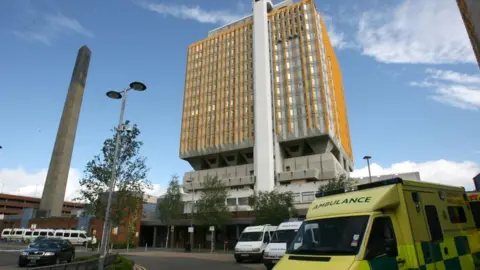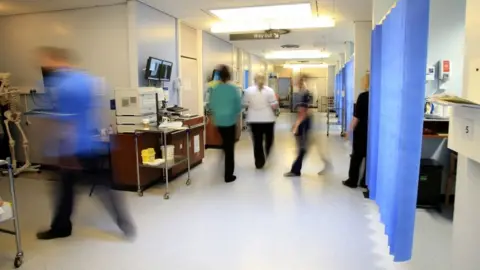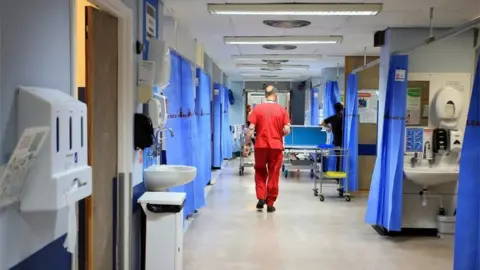Coronavirus: Belfast elective surgeries cancelled
 PA Media
PA MediaMore than 100 elective surgeries have been cancelled in Belfast due to Covid-related pressures.
The Belfast Health Trust says it has now reached the "trigger point" for admitting patients to intensive care in the Belfast City Hospital tower block.
The trust's clinical director said "unfortunately some people had to be told face to face".
Chris Hagan said the number of Covid cases rising in the community had "forced us to do this".
Meanwhile, it emerged on Tuesday night that more than 30 nurses are self-isolating as a result of a Covid-19 outbreak at two hospitals run by the Northern Health and Social Care Trust.
 PA Media
PA MediaAs of Tuesday, 150 people were in hospital being treated for coronavirus - 23 of them are in intensive care and 15 are on a ventilator.
Belfast City Hospital tower block was the designated Nightingale hospital during the first wave of the pandemic.
The Mater Hospital has reached its capacity for Covid patients - almost 80 people - 10 of whom are on a ventilator.
Although patients are now being admitted to Belfast City Hospital intensive care unit (ICU), any decision to fully reopen the Nightingale facility will be for politicians.
"We need approximately 80 staff to staff a 12-bedded ICU," said Mr Hagan.
"That meant we had to cancel those operations this week, that was a really terrible thing that we had to do.
"It's not something we did lightly. It's something we regret having to do."
A total of 105 operations were cancelled and Mr Hagan said he hoped they could be rescheduled as quickly as possible.
Theatre nurses
The Northern Health and Social Care Trust confirmed three theatre nurses working at Antrim Area and Mid Ulster Hospitals have tested positive for the virus.
As a precaution, it has advised 30 others to self-isolate.
It adds that staff-to-patient transmission is not a concern because theatre nurses wear full personal protective equipment (PPE) while carrying out their clinical duties.
No operations have been cancelled as a result of this outbreak and the nurses are expected to begin returning to work this week.
The trust believes the "index case" could have resulted from community transmission.
"This highlights the need for absolute vigilance and adherence to the rules in relation to effective social distancing, hand hygiene and the wearing of face coverings," the trust said.
'Massive challenge'
Meanwhile, the BBC can reveal that Covid-related pressures led to the cancellation of 622 elective procedures across all five health trusts, between 1 September and 11 October.
The figure, provided by the Health and Social Care (HSC) Board, includes 75 inpatients and 547 day cases - and amounts to 3% of the total elective activity.
The HSC said it was facing a "massive challenge" to rebuild health and social care services in the wake of the first Covid-19 wave.
"For example, social distancing protocols reduce overall capacity while staffing numbers are being negatively affected by the need to isolate, while other services are impacted by staff being redirected to support Covid ICU," the HSC said.
"We would apologise to patients for any inconvenience caused and thank them for their patience and understanding in these exceptional circumstances.
"Every effort will be made to undertake additional activity in elective specialties to ensure patients whose procedures have been postponed are seen in a timely way."
Northern Ireland currently has the longest hospital waiting lists in the UK - with more than 300,000 people waiting for a first appointment with a consultant.
New figures will be published again in November.
 PA
PALast week, the Royal College of Surgeons (RCS) called for beds to be "ring-fenced" to prevent a "tsunami of cancellations".
Mr Mark Taylor, RCS spokesman in Northern Ireland said he understood the current postponement of procedures by the Belfast Trust was a "temporary measure".
"There's no doubt that there are people today who are going to be disappointed and we have to remember they are waiting on surgery to relieve cancer, surgery to relieve pain, surgery to relieve whatever the condition may be," he said.
"But I am sure that we all collectively will work together to work a way through the second surge."
Rita Devlin, from the Royal College of Nursing, said the long-running staff shortage had compounded the problems presented by Covid-19.
"We know at the end of June, the Department of Health reported we were 2,039 nurses, midwives and midwifery assistants short of what we should have," she said.
"When you factor in sick leave, maternity leave and nurses having to isolate you can see the size of the gap in the workforce and you can see the size of the problem that we are facing in this now emergency Covid situation."
